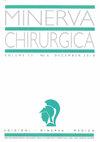Quality of recovery after major emergency abdominal surgery: a prospective observational cohort study.
IF 1.3
Q3 Medicine
引用次数: 6
Abstract
BACKGROUND Major emergency abdominal surgery results in high morbidity and mortality. We aimed to describe patient-reported quality of recovery after major emergency abdominal surgery. METHODS A prospective observational cohort study of patients undergoing major emergency abdominal surgery at a University Hospital was conducted in the period between November 2016 and February 2017. Patients were interviewed using the 15-item questionnaire Quality of Recovery (QoR- 15) six times over the first 30 postoperative days. Patients' maximum score of QoR-15 ranging from 0- 150 were divided into four groups depending on recovery status going from poor (score of 0-89), moderate (score of 90-121), good (score of 122-135) to excellent (score of 136-150) recovery. RESULTS A total of 37 patients were included in the trial. At postoperative day (POD) 1 the recovery status of the patients was mainly poor to moderate (poor n=8 (22%), moderate n=23 (62%), good n=4 (11%) and excellent n=2 (5%)). 16 (55%) of the patients reported a poor or moderate recovery within the first 7 days after surgery, which advanced to good or excellent recovery (n=19 (68%)) from POD 14. The patients were not fully recovered at POD 30 (n=18 (62%) had an excellent recovery). CONCLUSIONS Recovery measured by QoR-15 is substantially affected after major emergency abdominal surgery even after 14- and 30 days postoperatively. The patients were poor or only moderately recovered within the first seven postoperative days and only 62% of the patients were fully recovered at postoperative day 30.重大急诊腹部手术后的恢复质量:一项前瞻性观察队列研究
背景:重大急诊腹部手术导致高发病率和死亡率。我们的目的是描述重大急诊腹部手术后患者报告的恢复质量。方法:对2016年11月至2017年2月期间在某大学医院接受重大急诊腹部手术的患者进行前瞻性观察队列研究。在术后前30天内,对患者进行了6次问卷调查,问卷包括15个项目的恢复质量(QoR-15)。将QoR-15总分0 ~ 150分的患者根据恢复状况分为4组,分别为恢复差(0 ~ 89分)、中等(90 ~ 121分)、良好(122 ~ 135分)、良好(136 ~ 150分)。结果:共纳入37例患者。术后1天(POD)患者恢复状况以差至中为主(差n =8[22%],中n =23[62%],好n =4[11%],优n =2[5%])。16例(55%)患者报告术后7天内恢复不佳或中等,从POD 14期进展到良好或极好的恢复(n =19[68%])。患者在POD 30时未完全恢复(n =18[62%]恢复良好)。结论:QoR-15测量的恢复在重大急诊腹部手术后,即使在术后14天和30天也会受到很大影响。患者在术后7天内恢复较差或仅为中度恢复,只有62%的患者在术后30天完全恢复。
本文章由计算机程序翻译,如有差异,请以英文原文为准。
求助全文
约1分钟内获得全文
求助全文
来源期刊

Minerva chirurgica
医学-外科
CiteScore
1.40
自引率
0.00%
发文量
0
审稿时长
>12 weeks
期刊介绍:
Minerva Chirurgica publishes scientific papers on surgery. Manuscripts may be submitted in the form of editorials, original articles, review articles, case reports, special articles, letters to the Editor and guidelines. The journal aims to provide its readers with papers of the highest quality and impact through a process of careful peer review and editorial work.
 求助内容:
求助内容: 应助结果提醒方式:
应助结果提醒方式:


